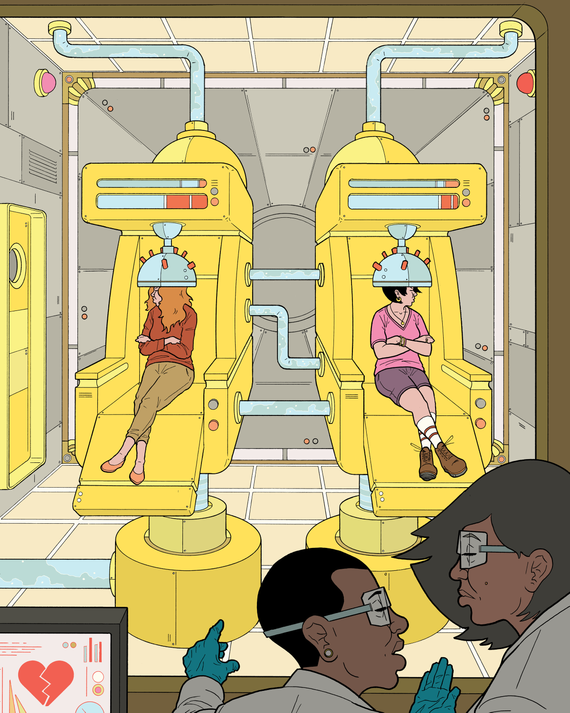
People like to say friend breakups hurt as much as romantic breakups as if they’re the first person to realize this. But they do have a point: I rarely think of the guy I dated in my early 20s, save for the occasional activation of a very specific scent memory (Bud Light and cigarette smoke). I lost a friend group in that breakup — I was new to Seattle, and they were his high-school friends, so, fair enough. I don’t think of them much, either, but part of my brain must still be mulling it all over, because sometimes they still show up in my dreams, 16 years later.
If you ask people directly about it, they’ll say feeling betrayed by a friend is equally as painful as feeling betrayed by a romantic partner, something social psychologist Mahzad Hojjat has asked people in her research. “But then we asked them, ‘Hypothetically, what do you think people are more upset about?’ Then they chose romantic relationships,” she tells me. We think, in other words, that everyone else thinks romantic relationships have more power to hurt us than our friendships, when in our own experience we know they’re often the same. Friend breakups are often a private kind of pain.
“When I was dumped by a boyfriend, my friends came over to comfort me — they checked in on me, they made sure I was doing okay,” Amy, who’s in her early 30s, says. She now lives in Europe, but she spent much of her 20s in New York living with Michelle, her roommate and best friend. But then Amy moved away, and Michelle slowly stopped responding to her texts. “With this, there was no clear event. And, I mean, I lived with her longer than I’ve lived with any partner, ever. So it was, in that sense, a much bigger deal. But the support system didn’t kick into gear.”
And, really, how could it have? Your friends probably know your ex-friend, which makes the kind of cathartic shit-talking you do after losing a significant other not exactly an option. But the bigger problem might be that, unlike most romantic relationships — which typically have a clear, definitive end — it’s more likely for friendships to wither slowly, eventually dying of neglect. People like to say there’s no script for a friendship breakup, but there sort of is, and it’s dead silence punctuated by the occasional “omg sorry i’ve been soooo busy” reply.
Dr. Beverley Fehr, a social psychology professor at the University of Winnipeg who’s studied friendships for about 40 years, once asked people how they would handle conflicts in a romantic relationship versus a friendship. “In a romantic relationship, people say you should talk it over,” Fehr said. “But friendships? Just the opposite. People are really, really conflict-avoidant in friendships.” Most people, she’s found, pull back from a friendship when they’re upset. For some, it’s the first step toward a breakup. For others, it’s just a temporary step back in hopes things will get better. “The problem with that is your friend doesn’t know what your motivation is,” Fehr said. “All your friend knows is you’re avoiding them.”
Ten years after Michelle started avoiding her, Amy still dreams about her, just like I still dream about those Seattle friends. “This is the only recurring dream I’ve ever had in my life,” she says. It always goes the same way: They unexpectedly meet somewhere, they say how much they’ve missed each other, and they cry and hug. “One time, I actually did run into her unexpectedly,” Amy tells me. Her heart was racing, but she tried to catch Michelle’s eye to say hello. “And she turned her back on me.”
In the aftermath of the most famous friend breakup of my youth, Paris Hilton said of her then-ex-friend Nicole Richie (they’re on-again), “Nicole knows what she did.” You gotta wonder if maybe she didn’t. Amy eventually wrote Michelle a letter to apologize while also asking her to clarify what exactly she needed to apologize for. She never heard back. “It’s just this complete mystery,” Amy says. “What did I do? What happened?”
It’s somewhat obvious to say that uncertainty drives us nuts: It’s what fuels anxiety and keeps astrologists in business. But it also might be easy to underestimate the degree to which people hate feeling like they’re in the dark. Most people would rather definitely get an electric shock right now than maybe get shocked later, and people tend to show more signs of physical stress when waiting for an unpredictable shock than a predictable one. You could even argue, as some neuroscientists do, that your brain’s most important job is to reduce uncertainty. Maybe that’s why it’s become so popular in the last ten years or so to talk about “cutting off” friends who are “toxic” — that kind of decisive action feels psychologically safer than endless ambiguity.
“In an uncertain situation,” the researcher and author Lisa Feldman Barrett recently wrote for Scientific American, “your brain must assemble multiple predictions with multiple action plans and maintain them for an extended time through neuronal activity and other brain functions.” It takes energy to rehearse all of that, which helps explain why a friend fading out on you can feel so bad on a physical level.
Then again knowing why a friend dumped you probably won’t help you feel any better. When Maria Konnikova, the author and psychology Ph.D., was a freshman in college, she made fast friends with a group of girls — all freshmen and all of whom happened to speak Russian, like Konnikova. Then one day — out of nowhere, as far as Konnikova knew — they came to her dorm with an announcement. They’d talked it over, and they’d decided she no longer fit into their friend group. Twenty years later, just recounting the story makes her feel a little sick. “My body is having a low-key stress response to it right now,” she said. “I viscerally feel it in my arms, in my stomach.”
They gave Konnikova a reason: She was too competitive. Konnikova has no memory of being especially competitive with any of these friends, but she did go on to become a successful professional poker player, so. Who knows. But the thing about friends, and especially best friends, is they’re supposed to see our flaws — even call us on them — and love us anyway. “I feel like one of the main differences between a friend and a best friend is a best friend will let you be the worst version of yourself,” some guy on TikTok said in a video posted in late July, which has so far apparently resonated with 1.3 million people.
A psychologist might call that “unconditional positive regard,” a phrase popularized by the therapist and author Carl Rogers in the 1950s: accepting someone for who they are, and choosing to see the best in them. In her story for The Atlantic on midlife friendship, Jennifer Senior quoted a researcher who invoked the phrase to describe friendship at its best. It’s a lovely sentiment. It also suggests that when a close friendship ends, it means she saw you at your worst, and decided she hated it.
But what if you think you’ve got that “unconditional positive regard” kind of friendship, when to her you are a peripheral friend at best? A friend of mine, let’s call her Heather, is the type to say “I love you” with abandon, which is one of the reasons I love her. Years ago, she got a handwritten letter from a friend who, essentially, claimed that this sort of thing was tantamount to leading her on. “She said that while I would say things like ‘I love you’ to her, she felt like I didn’t spend enough time with her or prioritize her enough,” Heather told me. At the time, Heather was a new mom; she wasn’t spending much time with anyone except her baby.
She was, and is, confused by the letter, but she doesn’t sound particularly hurt by it. “I think it was a mismatch of expectations,” she says, generously. In fact, most people are probably making those kinds of mistaken assumptions about their friendships: On average, only about half of your friends likely consider you a friend in return, according to a study I came across in 2016 that has continued to haunt me.
So much about friendship goes unspoken. It’s what makes the good ones, frankly, kind of magical: There’s no formal agreement tying you two together except the fact that you like each other. Fehr has been quoted in approximately a zillion articles about friendship, and it bugs her when writers take her findings — that people tend to back away from conflict with a friend rather than confront it directly — and assume this must mean that to preserve a friendship you should deal with conflict directly.
“The pop-psych advice is always just to talk things over with your friend,” Fehr says. “But that’s not as simple as it sounds, and in fact it can often backfire.” Honestly, I’ve written about psychology for more than a decade now, and I am guilty of providing exactly this sort of advice. Once, I tried it in my own life. I told a friend she’d hurt my feelings, like I was 4 years old. She recoiled — physically recoiled at the restaurant table — and our friendship never really recovered. I wonder what might’ve happened if I’d just let the hurt go. Maybe a friendship as fragile as that was never meant to last, anyway.
In any case, losing friends isn’t always a bad thing, and it’s not uncommon, either; we replace about half our friends every seven years, according to one study. Some friendships might just be more durable than others, and for those, talking it out can work, obviously. A light touch and a sense of humor helps. I have a college friend I like to travel with, and for us, teasing seems to work. “I don’t think you even know your own name in the morning,” she said to me once after gently suggesting that next time we needed to catch an early morning train, I should maybe pack the night before.
But maybe sometimes the best thing to say is … nothing. As an adult, Konnikova has let friendships end this way. “The thing is it looks the same as actually drifting apart,” she said. “You don’t have time for that many close friendships, and some of them are going to cycle in and out. Everyone has people in their life where they just drift apart naturally.” Why not let friendships end in a bit of mystery? It’s usually a mystery how they start, too. Slamming the door shut — no, we are not friends — can feel better than not knowing where you stand. But tolerating that ambiguity could keep the door propped open. Just in case.
More From This Series
- A Night of Making New Friends in Brooklyn
- Friend Breakup Stories From Our Readers
- Will Going Into Business Together Destroy Our Friendship?




